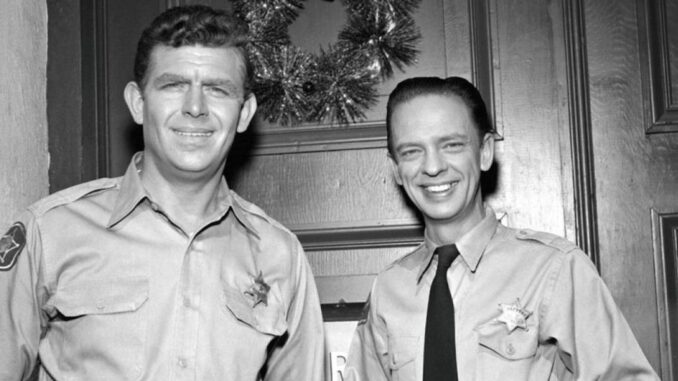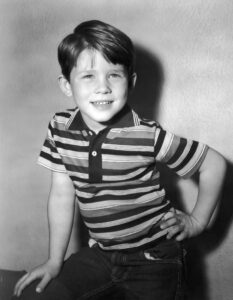
The Andy Griffith Show’s Ron Howard Revealed What the Show Was Actually About
If you grew up glued to your TV set watching The Andy Griffith Show, you probably thought it was just another light-hearted comedy about small-town life. But according to Ron Howard—who played the beloved Opie Taylor—there was a deeper, more powerful meaning behind all those fishing trips, whistled theme songs, and pie contests.
Let’s dive into what Howard revealed and why The Andy Griffith Show still resonates decades later.
The Timeless Charm of Mayberry
Mayberry wasn’t just a town; it was a symbol. While most TV shows in the ‘60s went for big city glitz or action-packed storylines, The Andy Griffith Show stood out like a front porch light in the dark.
Ron Howard’s Unique Perspective as a Child Star
Ron Howard wasn’t just a cast member; he grew up on the set. His perspective gives fans a rare, authentic insight into what The Andy Griffith Show truly stood for.
What Ron Howard Said About the Show’s Deeper Meaning
In interviews, Ron Howard has explained that The Andy Griffith Show was never about gags or punchlines. It was about relationships — how people treated each other, trusted each other, and navigated life’s small but significant challenges.
“It Was About Values, Not Jokes,” Says Howard
Howard emphasized that the show didn’t rely on big laugh tracks. Instead, it leaned on core values like honesty, kindness, forgiveness, and patience — lessons that quietly wove their way into every storyline.
The Relationship Between Andy and Opie Was Central
Ron Howard highlighted how much care was given to the relationship between Andy and Opie. It wasn’t just a father teaching his son — it was two human beings learning from each other.
Andy Griffith’s Leadership Behind the Scenes
Howard often credits Andy Griffith not just as the lead actor but as a mentor to the entire cast. Griffith set the tone for the set: professional, relaxed, and deeply respectful.
Why the Simplicity of Mayberry Was Intentional
Howard explained that Mayberry wasn’t meant to feel “realistic” in the strict sense — it was idealized. A simpler time, a simpler place, where the focus stayed on human decency rather than sensationalism.

How Mayberry Reflected a Nostalgic America
Even in the 1960s, America was rapidly changing. The Andy Griffith Show offered a nostalgic snapshot of a world that felt like it was slipping away — a world defined by neighborliness and compassion.
Ron Howard On Learning Life Lessons On Set
In various interviews, Howard has confessed that many of the moral lessons he learned in childhood came straight from the scripts of The Andy Griffith Show.
Friendship Was As Important As Family
Ron Howard pointed out that the friendships on the show — like those between Andy and Barney — were every bit as central as family ties. Trust and loyalty were the backbone of Mayberry.
The Show’s Humor Was Built on Character, Not Situations
According to Howard, the humor wasn’t about setting up gags. It was about characters being themselves — their quirks, their heart, their sincerity.
Ron Howard’s Take on Why the Show Still Resonates
Howard believes that in a world that feels more complicated and chaotic every day, The Andy Griffith Show still offers comfort because it reminds us of the basic goodness that can exist between people.
What Modern Shows Could Learn From Mayberry
Ron Howard suggests that today’s TV writers could take a page from The Andy Griffith Show by focusing less on spectacle and more on creating genuine emotional connections between characters.
The Influence of Ron Howard’s Experience on His Directing Career
It’s no coincidence that Ron Howard, now an Oscar-winning director, often emphasizes heartfelt storytelling in his films. His years on The Andy Griffith Show shaped his entire artistic philosophy.
A Show About Kindness, Community, and Connection
In the end, as Ron Howard so beautifully sums up, The Andy Griffith Show wasn’t about a sleepy Southern town or even about being funny. It was about how people should treat each other — with decency, respect, and love.
Conclusion
Ron Howard’s revelations about The Andy Griffith Show peel back the layers of what has always felt so special about Mayberry. It wasn’t the fishing trips or the town gossip that made the show timeless — it was its heart.
At its core, the series offered a blueprint for a kinder world, showing us that sometimes, the smallest gestures — a word of encouragement, a second chance, a moment of patience — can echo the loudest.
Maybe that’s why, even after all these years, Mayberry still feels like a place we all want to visit.
FAQs
1. What did Ron Howard say was the real message of The Andy Griffith Show?
Ron Howard explained that the show was truly about relationships, values, and simple acts of kindness, not just jokes or slapstick humor.
2. How did Ron Howard’s experience on The Andy Griffith Show influence his directing career?
Howard said that his years on the show taught him the importance of storytelling with heart, a principle that runs through his work as a filmmaker.
3. Was Mayberry based on a real town?
While Mayberry wasn’t based on one exact town, it was inspired by Andy Griffith’s real hometown of Mount Airy, North Carolina.
4. Why do people still love The Andy Griffith Show decades later?
Because it taps into timeless values like community, friendship, and compassion—universal themes that still resonate with audiences today.
5. Did Andy Griffith have creative control over the show?
Yes, Andy Griffith had significant creative influence, shaping the tone, humor, and emotional depth of the series, according to multiple cast members, including Ron Howard.